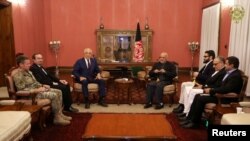The U.S. special representative for Afghanistan reconciliation, Zalmay Khalilzad, has held another round of marathon discussions with Qatar-based Taliban officials to push for a politically negotiated settlement to the 17-year war.
Khalilzad's three days of meetings with the Islamist insurgency concluded on Friday and both sides were "optimistic about the dialogue process," multiple Taliban sources said Saturday.
Neither side, however, has officially confirmed or released details of this week's talks in Doha, the capital of the Gulf nation, which houses the so-called "political office" of the Afghan Taliban.
This was Khalilzad's second interaction with the Taliban in more than a month. The Trump administration appointed him to the office in September with the goal of bringing the Afghan government and the insurgent group to the negotiating table.
Insurgent sources noted that former prisoners of the U.S. Guantanamo Bay detention center, Mullah Fazal and Mullah Khairkhaw, also joined the Taliban delegation in talks with the U.S. team.
The Taliban says its dialogue process with Washington is aimed at securing a timetable for the withdrawal of all American and NATO troops from Afghanistan to pave the way for an intra-Afghan dialogue.
"When we reach a solution about the pullout of all their forces then we enter a second phase (of discussions) among Afghans (themselves) on how to bring about peace and form a government in Afghanistan," Sohail Shaheen, who speaks for the Taliban's Qatar office, told reporters in Moscow last week.
Shaheen was in the Russian capital as part of a five-member Taliban delegation that attended for the first time an international conference Russia hosted to discuss Afghan peace efforts.
The insurgent group says in meetings with the U.S., it also is seeking the release of its prisoners and the removal of international travel restrictions on senior Taliban leaders.
After last month's meetings with Afghan officials and Taliban representatives, Khalilzad had called for both sides to form their respective authorized teams for peace talks.
Since then, the Taliban has inducted into its Doha "political office" five senior insurgent leaders, who were swapped for the freedom of an American hostage in 2014. The United States released the men from its Guantanamo detention center to authorities in Qatar, in exchange for Sgt. Bowe Bergdahl, the only American soldier taken prisoner by the Taliban in Afghanistan.
For his part, Afghanistan's president, Ashraf Ghani, has been holding discussions with leaders and representatives of Afghan political parties, as well as civil society organizations for the formation of an "advisory council and a negotiating team."
Ghani's office said Saturday the meetings will continue for several more days and the government is determined to proceed with a peace process based on national consensus.
It quoted the president as cautioning "the route to peace is full of obstacles, and we need to be ready to employ all available tools for gaining a positive outcome."
Speaking this week via video link to an audience in Washington, the Afghan president appeared upbeat about the prospects of peace talks. Responding to domestic critics that the U.S. has not taken Kabul into its confidence before opening talk with the Taliban, Ghani noted that many of the ideas and the plans Khalilzad is discussing with the Taliban actually have come from the Afghan government.
"The U.S. engagement (with the Taliban) is to ensure that talks with the Taliban result not in negotiations with (the) Taliban but direct talks between the Afghan government and (the) Taliban," Ghani said.
The president said his government is prepared to tackle all the issues on the negotiating table to try to bring an end to the deadly war in Afghanistan. He disclosed in his speech that since 2015, his government security forces have lost more than 28,500 personnel in the battle with the Taliban but Ghani denied the insurgents were in a winning position on the battlefield.
A senior Afghan peace negotiator who met Khalilzad during his recent trip told reporters in Kabul the American envoy has been given six months to produce an outcome for the U.S. administration.
Khalilzad's office has neither commented on these assertions nor onengagements with the Taliban.





